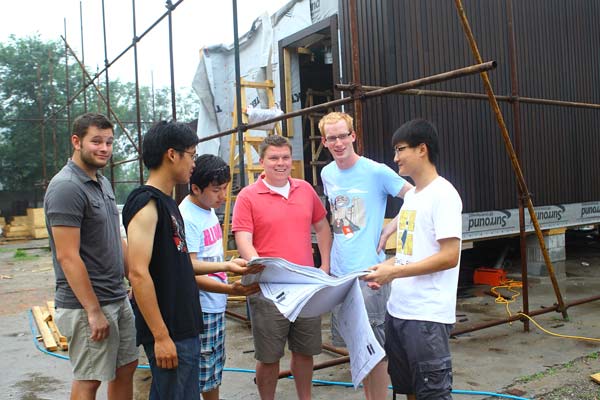A dream home helps build the future
|
 |
|
Liu Yang (second from left), Michael Cai Wang (third from left) and Kevin Donovan (third from right) talk at the construction site of their solar-powered house, Etho, in Beijing. Zou Hong / China Daily |
An international contest is giving Chinese and foreign youths a chance to build their dream home.
Liu Yang, a student from Peking University majoring in architectural design, said he cannot wait to see his ideal house become a reality.
"My companions and I discussed the design on Skype and thousands of e-mails with overseas partners over the past year before construction began," the 26-year-old said.
"For me, it is a little painful to communicate with overseas students in English," he said, half-jokingly.
"But I thought it will be helpful to improve my English. Moreover, I knew about architectural design ideas."
The house, named Etho, was jointly designed by around 160 students from Peking University and the University of Illinois.
The construction of the 99-square-meter solar house with two bedrooms and a bathroom began in mid-June near the east gate of Peking University.
The construction site is temporary. The house, divided into four modules, will be transported to Datong, Shanxi province, in July when it is completed. It will be exhibited during the Solar Decathlon China 2013, a contest jointly organized by the National Energy Administration, the US Department of Energy and Peking University.
The decathlon is an international event that has been held in the United States and Europe for the past decade. This year will be China's inaugural event as well as the first competition in Asia. Participants have to design and build solar-powered houses.
Participants include 22 teams from 35 universities with students from more than 35 nationalities in 13 countries and regions.
Besides using renewable energy sources, Etho features a home automation system that allows occupants to control a number of features through a tablet, phone or computer.
The system can also change lighting levels and allows for the monitoring of appliances and outlets.
The cost of the building is about 1.5 million yuan ($244,500) to 2 million yuan. "After the contest, we will try to sell it at that price. A domestic company has already came to discuss buying it, to use it as an example on how to save energy," Liu said.
Michael Cai Wang, 24, a doctoral student from University of Illinois, can speak Chinese and often serves as translator.
He immigrated with his parents from Nanjing, Jiangsu province, to Canada when he was 7. "I return to visit relatives every two or three years, but it is my first time to work together with Chinese students my own age," he said.
Students have to learn to compromise to keep the project going on and try to make everyone happy, he said.
Kevin Donovan, 29, from the University of Illinois, said he learned about the differences in housing culture.
"We had open dialogue and discussions with Chinese students. Etho is a house of compromise between Western layout and Chinese layout," he said.
Registration Number: 130349



























